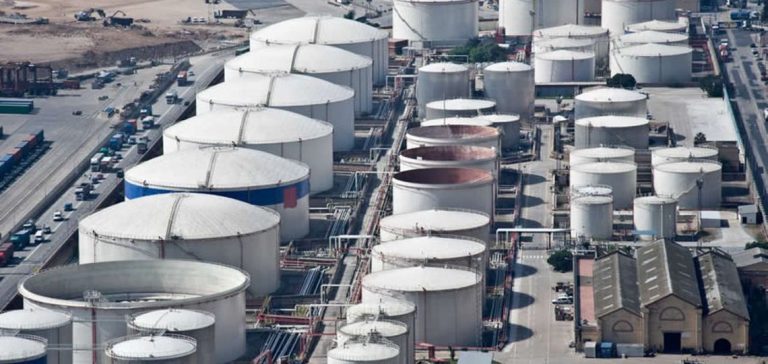US commercial crude oil stocks recorded a rise of 3.9 million barrels during the week ending September 27, exceeding analysts’ expectations, who had anticipated a decline of 1.4 million barrels. This unexpected increase contrasts with the consensus established by Bloomberg and reflects a notable shift in the American energy sector.
This rise in inventories is primarily attributed to the slowdown in US refinery activity. Refining facilities operated at 87.6% of their capacity last week, compared to 90.9% the previous week, indicating the lowest utilization rate in five months. This deceleration is largely due to the oil companies entering their annual maintenance period, a common practice in October and February when demand is traditionally lower.
The reduction in refinery activity should theoretically lead to a decrease in refined product inventories. However, the stocks increased due to a drop in demand. The volumes of refined products delivered to the US market, an implicit indicator of demand, fell by 7% over a week. This decline was particularly pronounced for gasoline (-7%), distillates including diesel (-10%), and the propane and propylene category (-34%), largely destined for heavy industry.
Impact on the Oil Market
US gasoline stocks increased by 1.1 million barrels, while analysts had expected a more modest rise of 200,000 barrels. This increase exceeds expectations and could influence oil prices in the international market. In addition to the reduced activity of refineries, the rise in crude stocks can also be explained by a slight increase in imports (+2.7%), while exports remained relatively stable (-0.5%).
US crude oil production has reached its historic record level of 13.3 million barrels per day, compared to 13.2 million during the previous period. This recovery in production also contributes to the increase in stocks, despite a declining demand. The report from the US Energy Information Administration (EIA) had a significant impact on the market, which had been in a strong upward trend following the Iranian attack on Israel on Tuesday.
At 15:15 GMT, the price of West Texas Intermediate (WTI) for November delivery was up only 1.33%, reaching $70.76, after having risen by as much as 3.80% earlier in the day. This price volatility reflects the current uncertainties in the global oil market.
Outlook and Analysis
Matt Smith, an analyst at Kpler, explains that the refinery slowdown is an expected response to the maintenance season. “In October and February, refiners take advantage of a period of weaker demand to perform maintenance and repairs on their facilities,” he notes. This strategy helps maintain the operational efficiency of refineries while adjusting production according to seasonal demand fluctuations.
The decline in demand for refined products, especially gasoline and diesel, could also be linked to broader economic factors, such as slowdowns in certain industrial sectors or changes in consumer consumption habits. These dynamics will need to be closely monitored to anticipate future trends in the oil market.
Consequences for the US Economy
The increase in crude oil stocks and the drop in demand for refined products can have several repercussions on the US economy. On the one hand, higher stocks may put downward pressure on oil prices, which could benefit consumers by reducing the cost of gasoline and other derived products. On the other hand, a prolonged decline in demand could impact the profitability of refineries and potentially lead to adjustments in production operations.
The EIA report also highlights the importance of energy market stability for the overall economy. Effective stock management and quick adaptation of production and refining capacities are essential to respond to demand fluctuations and maintain market balance.
Reactions from Sector Players
Companies in the oil sector are closely monitoring these developments. Some may consider strategic adjustments to optimize their production and distribution based on new stock and demand data. Moreover, investments in refining infrastructure could be influenced by current trends, with a particular focus on operational efficiency and flexibility.
Additionally, national and international energy policies could be impacted by these market movements. Policymakers will need to evaluate the economic and environmental implications of these changes to develop strategies aimed at ensuring the resilience and sustainability of the energy sector.






















